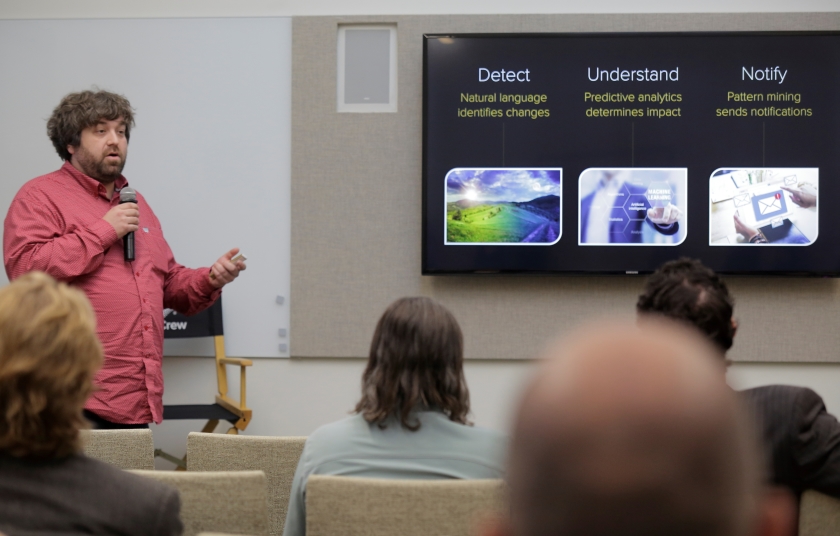Exclusives

HITS Fall: Hollywood Must Digitize to Survive, Cast & Crew’s Aubuchon Says
Story Highlights
Every business, regardless of industry, is becoming a digital business, so each company must digitize to survive … and Hollywood is no different, according to Guillaume Aubuchon, a member of the Product Innovation team at Burbank, Calif.-based Cast & Crew Entertainment Services.
Therefore, it’s important for companies in the movie industry to take advantage of all the digital technologies they have at their disposal now, including machine learning and real-time data, he said Oct. 18 during a presentation on “Making Better Movies by Making Movies Better” at the HITS Fall: Hollywood Innovation & Technology Summit event in Los Angeles.
“Every industry is becoming a digital industry — software, cloud, apps; it’s eating all industries, so, “ultimately every company must digitize to compete,” he told attendees. He pointed to several other industries that have faced similar challenges. For instance, the auto industry faced a “lack of innovation” while trying to “deal with increased competition,” he said. The finance and insurance sector, meanwhile, “faced a lack of agility problem” when dealing with security and other issues, and the healthcare and pharmaceutical sector dealt with a “lack of efficiency in their process,” he said.
All the challenges those industries faced could be “solved through digitization of assets, automatization of processes and application of digital workflow,” he said. Auto makers are using real-time cloud data now to “inform the manufacturing process and the usability of vehicles,” and “each mile driven by cars on the road provides data that improves the process over time,” he told attendees.
Meanwhile, finance and insurance companies are using machine learning, he said, pointing out finance companies are “aggregating data to predict and respond to security threats almost instantly” and can improve loans more quickly now.
Companies in the healthcare industry are “digitizing the paper process to increase efficiency, reduce error and correlate patterns in data,” he told attendees.
Algorithms, data and software are what “drives the efficiency” for those processes, he said, adding: “Whether your process involves robots, grips, wardrobe, transportation, it’s the software and data that makes it all happen.”
Movies have a 100-year “tradition of technological innovation,” he went on to say. “From the first train that frightened people in silent movie theaters to today, we have continued to innovate. But that’s largely been on screen” in the form of more realistic trains, switching to higher resolutions and other such initiatives, he said. It’s all been about improving the technology on screen, but “we’ve had little investment in bettering the underlying process” that allows all that on-screen innovation to continue happening, he said, warning “chaos is not the hallmark of creativity” and Hollywood needs to get rid of some of that chaos.
He explained: “We need to change how we think about production and there is a better way.” Moviemaking is a business designed to make a profit, so companies must take some necessary steps to help that to continue, he said.
“I’m not suggesting that we replace PAs [production assistants] with robots – yet…. Merely that digitizing those scripts would free up those same PAs from fighting with those copy, print and fax machines to do what’s most important,” which includes “figuring out how to carry 18 cups of coffee,” he joked.
“We need to think of every step of the production process as being a process,” he said, noting that planning and pre-production, the labor of physical production, the monetization of assets and return on investment of assets “are all processes within production” and all those processes “can be improved through efficiency, intelligence and optimization.”
The main question movie companies must ask is this, he said: “How do we put more time into creativity and less time into productivity?” And the very “first step is admitting you have a problem,” he said. Digitizing and aggregating assets will take movie companies on the right path, and it’s important to find a centralized, cloud-based storage solution that provides the flexibility to grant access to anybody who needs the data wherever they are globally, he said.
HITS: Fall 2017 was presented by Cast & Crew, with sponsorship by Ooyala, Sohonet, Microsoft Azure, Premiere Digital, TiVo, LiveTiles and Veritone. The bi-annual conference focused on innovation and technology is produced by MESA in cooperation with Hollywood IT Society (HITS), Content Delivery & Security Association (CDSA), Smart Content Council (SCC) and Women in Technology Hollywood (WiTH).









